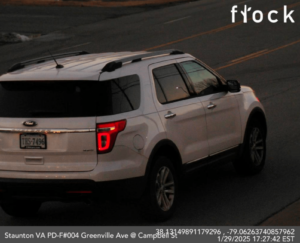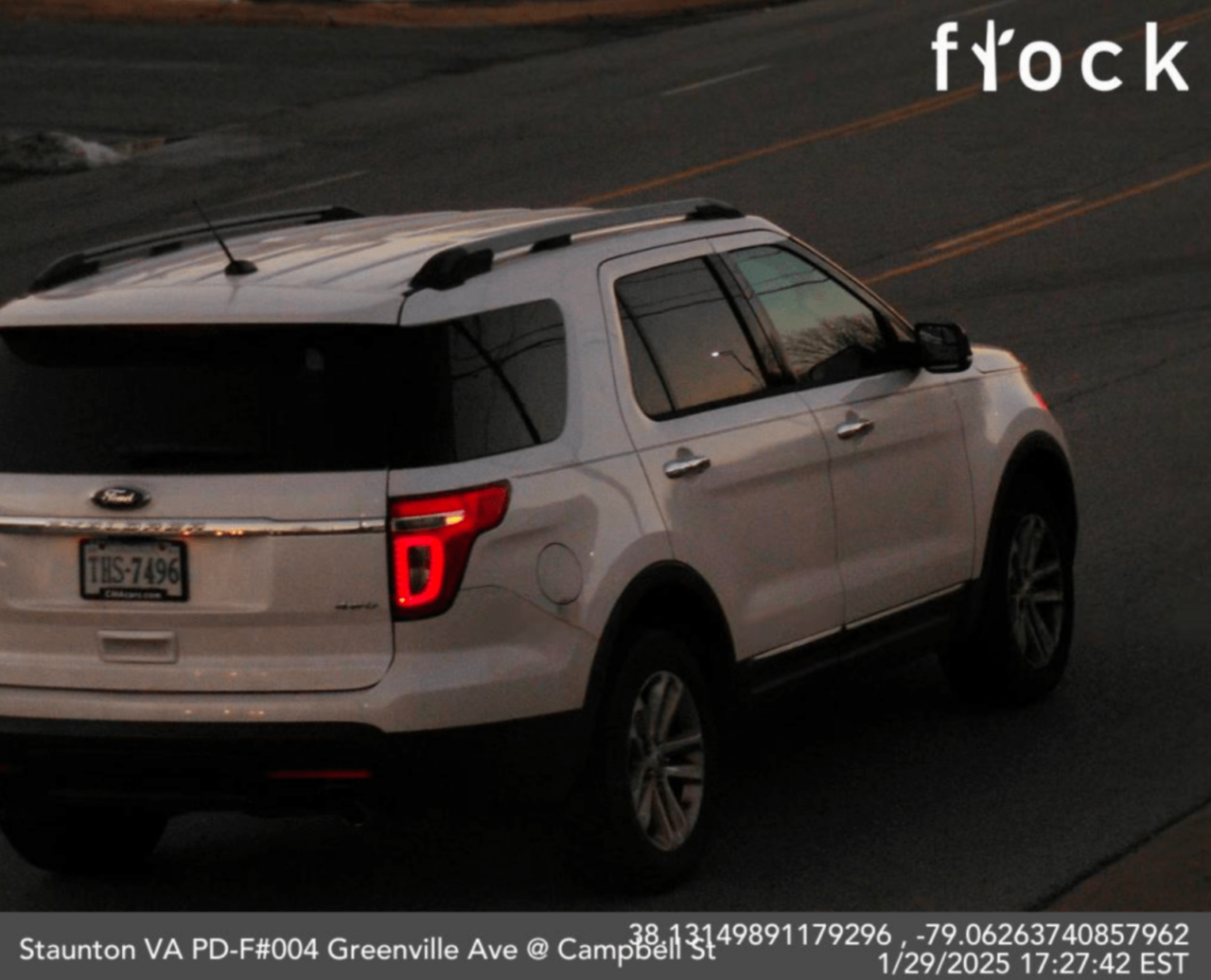Automated License Plate Readers in Virginia
By: John Peaden

Cameras are ubiquitous. You speed through a traffic light near Washington, D.C. and receive a speeding ticket in the mail. You drive through an EZ Pass Lane and get a photo captured of your car which then bills your account.
Unbeknownst to most, however, is that 167 law enforcement agencies across Virginia are now using public-facing surveillance technology such as Automatic License Plate Readers (“ALPR”) and gunshot listening devices.[1] ALPRs collect and retain data on a vast number of vehicles, regardless of whether the driver or any occupants are engaged in criminal activity.[2] This data can be used to track a vehicle in real time or analyzed to identify individual movements and patterns of behavior.[3]
The city of Norfolk has deployed 172 ‘Flock Safety’ ALPRs, resulting in numerous lawsuits.[4] One particular lawsuit, filed in October 2024 by a Norfolk resident claiming the cameras violate their privacy, will proceed in the United States District Court for the Eastern District of Virginia after Chief Judge Mark Davis denied the city’s motion to dismiss.[5] Chief Judge Davis’s ruling is apt, given the conflicting state court decisions on Fourth Amendment issues surrounding law enforcement’s use of ALPR, and features the latest chapter in the ongoing societal balancing act of law enforcement efficacy and civil liberty.[6] The lawsuit seeks declaratory and injunctive relief that would constitute the use of these cameras as a Fourth Amendment violation and would permanently enjoin the City of Norfolk and its police department from operating the Flock cameras.[7]
What exactly are ALPRs?
ALPRs consist of one or more high-speed cameras combined with computer algorithms to convert images of license plates into computer-readable data.[8] The cameras capture a photograph or video clip of a vehicle and its license plate, along with the location, date, and time of the image.[9] The data, which includes photographs of the vehicle, is then uploaded to a central server and can be shared with other agencies.[10] ALPR images can be searched by license plate number (full or partial) and vehicle information (make, model, and color).[11] Law enforcement uses ALPR primarily for two reasons. First, ALPRs generate alerts that notify law enforcement of known license plates and vehicles of interest.[12] Second, law enforcement can search ALPR data to develop leads in criminal and community safety matters.[13]
What legislation governs this increasingly omnipresent ‘smart’ crime-fighting device?
That answer shall be determined based on whether Governor Glenn Youngkin signs HB 2724 into law after his proposed amendments (notably – increasing the data retention period from 21 days to 30) were rejected on April 2nd during the General Assembly’s 2025 reconvened session.[14]
However, Virginia’s regulation of ALPRs comes with a troubled past. In 2022, it was discovered that state law enforcement agencies had begun putting up ALPRs on state roadways.[15] Attorney General Jason Miyares, in response to a request from Senator Todd Pillion inquiring as to whether those agencies have the authority to use these cameras, said that the Transportation Board would need to seek the authority to install the technology on state roadways from the General Assembly.[16] In 2023, the Virginia House and Senate killed legislation that would have codified a 2020 Virginia Supreme Court decision allowing law enforcement agencies to use and store data from license plate readers after facing significant resistance from multiple civil rights groups expressing concern over the use of this mass surveillance tool.[17] In 2024, companion bills were introduced by Senator Scott Surovell (SB 503) and Delegate Irene Shin (HB 920) to apply guardrails on ALPRs, however, both faced a similar fate when each effectively died in their respective chamber as a result of bipartisan disputes.[18] The three main points of contention involved whether a search warrant should be required, how long ALPR data should be retained, and the placement of ALPR devices on Virginia state highway right-of-ways.[19]
The result?
As long as Virginia law remains silent on the issue, each law enforcement agency is free to set its own policies regarding the use of ALPR technology.[20] Despite widespread discomfort with the idea of government monitoring our every move through so-called ‘dragnet surveillance,’ the absence of regulation that could impose reasonable safeguards on its use should raise concern. While the balance between effective law enforcement and civil liberties remains hotly contested – a substantial Fourth Amendment issue is quietly making its way through the courts that may ultimately determine whether these devices are repugnant to the Constitution.[21]
Link to image source: https://cardinalnews.org/2025/03/28/i-drove-300-miles-in-rural-virginia-then-asked-police-to-send-me-their-public-surveillance-footage-of-my-car-heres-what-i-learned/
[1] Lisa Rowan et al. State of Surveillance: Everyone’s Watching, cardinal news (Feb. 10, 2025), https://cardinalnews.org/2025/02/10/state-of-surveillance-everyones-watching/.
[2] Colin L. Drabert, Law Enforcement Use of Technology: Automatic License Plate Recognition (ALPR), Virginia State Crime Commission, Nov. 14, 2024, at 19, https://vscc.virginia.gov/2024/Nov14mtg/Presentation%20-VSCC%20ALPR.pdf.
[3] Id.
[4] See, e.g., Commonwealth v. Robinson, 113 Va. Cir. 494 (City of Norfolk, 2024) (holding defendant’s reasonable expectation of privacy was not violated); Commonwealth v. Bell, 113 Va. Cir. 316 (City of Norfolk, 2024) (holding collection of license plate data and location information constituted a Fourth Amendment search); Commonwealth v. Roberson, 113 Va. Cir. 565 (City of Norfolk, 2024) (holding photographing of license plate was not a Fourth Amendment search).
[5] Dan King, Judge Rules Lawsuit Challenging Norfolk’s Use of Flock Cameras Can Proceed, institute for justice (Feb. 6, 2025), https://ij.org/press-release/judge-rules-lawsuit-challenging-norfolks-use-of-flock-cameras-can-proceed/#:~:text=NORFOLK%2C%20Va.,reader%20cameras%20can%20move%20forward.
[6] See id.
[7] Compl., Lee Schmidt & Crystal Arrington v. City of Norfolk, Case No. 2:24-cv-621, (US Dist. Ct. E.D., October 21, 2024).
[8] Drabert, supra note 2 at 6.
[9] Id at 8.
[10] Data Driven: What Is ALPR?, eff, https://www.eff.org/pages/what-alpr#:~:text=Most%20of%20this%20ALPR%20data,companies%20such%20as%20Vigilant%20Technologies.
[11] Drabert, supra note 2 at 10.
[12] Id at 12.
[13] Id at 15.
[14] Markus Schmidt, Lawmakers push back on Youngkin budget, pass bipartisan bills on probation, dangerous driving, Virginia mercury (Apr. 3, 2025, 9:24 AM), https://www.whro.org/virginia-government/2025-04-03/lawmakers-push-back-on-youngkin-budget-pass-bipartisan-bills-on-probation-dangerous-driving.
[15] Elizabeth Beyer, An amended license plate recognition bill is headed to the Senate floor after twists and turns, cardinal news (Feb. 18, 2025), https://cardinalnews.org/2025/02/18/an-amended-license-plate-recognition-bill-is-headed-to-the-senate-floor-after-twists-and-turns/#:~:text=Those%20amendments%20caused%20law%20enforcement,3%20vote%20with%20one%20abstention.
[16] See id.
[17] Nathaniel Cline, License plate reader bills abruptly die in Virginia legislature, Virginia mercury (Feb. 23, 2023, 11:34 AM), https://virginiamercury.com/2023/02/23/license-plate-reader-bills-abruptly-die-in-virginia-legislature/#:~:text=License%20plate%20reader%20bills,a%20bad%20idea.%E2%80%9D%20%3C/.
[18] See H.B. 920, 2024 Gen. Assemb., Reg. Sess. (Va. 2024); S.B. 503, 2024 Gen. Assemb., Reg Sess. (Va. 2024).
[19] Supra note 2 at 21.
[20] Id at 29.
[21] See King, supra note 5.
